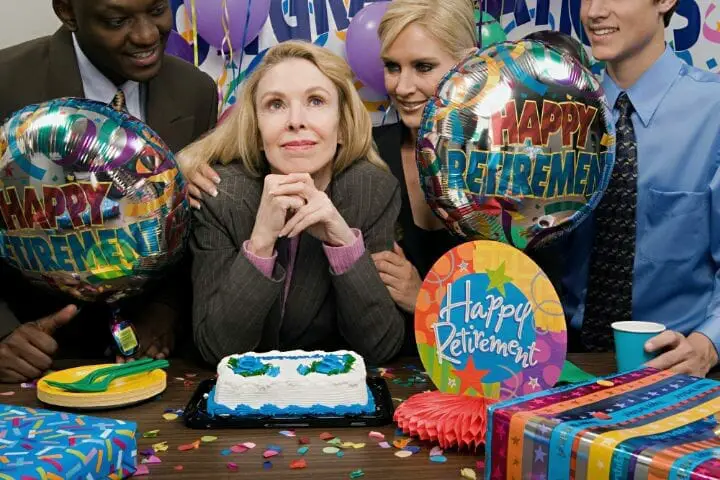So, you’ve made the decision that you’re ready to retire . . . now what? Many people come to the decision but they aren’t exactly sure what to do next or how to set their plan in motion. If you’re made the decision to retire, chances are you are still currently working so you’ll need to retire from your job.
If the company you work for has benefits into retirement, there could be a process for retiring to make sure you get the pension and benefits package your company offers.
This begs the question: do you need to give a notice period before you retire or is it similar to resigning? Here’s what you need to know.
Contents
Factors to Consider in Announcing Your Retirement
We’ve become very accustomed to a workforce world where employers can often terminate employees without any notice and it’s completely acceptable. So why, then, should employees have to give notice when it’s going the other way?
If you are currently working in a position, for a company, where you’re really unhappy and it’s just time to retire maybe you won’t give them much notice and that’s ok because there really isn’t a law that says you have to.
However, you should consider any benefits packages or pensions you may be getting from the company and make sure you give enough time for you to properly start the process for those things.
So financial and health benefit logistics aside, there is one other thing to consider in not giving any notice for your retirement: your colleagues.
Over the years you’ve worked for this company you’ve likely built some strong friendships, even if you aren’t super happy in the position you’re in. If you leave suddenly this could be hurtful for them, and any of your work that wasn’t completed may fall to them to finish.
You may also like 55 and Older Community Rules
How Much Notice Should You Give?
Depending on the position you’re in, the appropriate timeline for you may vary. Here are some general ideas as to how much notice you should give when it comes to announcing your retirement.
If You’re a General-Titled Employee
For this kind of position, you can likely just give the standard two-week notice you would give when resigning from a job. If you really enjoy the job and the people you work with, you may want to give more notice so that your colleagues don’t feel like you’re just leaving them.
If You’re in an Executive or Very Specialized Position
This type of career is a little more difficult to determine how much notice you should give before retiring. When it comes to these types of careers, what you should consider is how long it will take to find a person who can replace you in the company (provided the company will be filling your position).
Granted you do not legally have to give them this courtesy but if you want to retire on good terms then it definitely is something to consider. Searching for a replacement could take a couple of months, depending on what your job involves.
You may also like How to Get Into Assisted Living With No Money
If Your Job Is Primarily Project-Based
For this kind of career, you’ll probably want to consider the project you’re currently working on and how long it will take to finish your part of it.
Take into consideration the deliverables you will need to be part of or work on, and if there’s a possibility you will be assigned to another long-term project once this one is complete.
Consider your goal date for retirement and work backward to figure out if you can or want to stay until those projects are complete.
You may also like How Long Will One Million Dollars Last You In Retirement?
Having the Hard Conversation
Even if you’re really excited about retirement you still need to make your decision official, and this often means have a difficult conversation with your boss.
If you’re giving a long notice, or just putting the idea out there, you will likely want to tell your boss that you are thinking of retiring on a specific date but nothing is for sure yet.
If you aren’t totally sure about retiring, yet, ask your boss to keep things quiet for now until you’ve made some more concrete plans and you are comfortable announcing it.
Keeping it quiet can be helpful if you fear that your colleagues may start treating you differently knowing you’re leaving and won’t be part of the team anymore.
Hopefully, you have a good relationship with your boss and they will understand why you’d like to keep this quiet. Your boss may give you a final date where you have to solidify your decision by so once you have this conversation be prepared to make some definite choices.
Telling Your Colleagues
How you go about this will depend a lot on the relationship you have with your coworkers. After you’ve finalized the decision with your boss, you will likely want to find a way to personally tell the rest of the people you work with.
If you announce at a meeting that you are retiring, be prepared for the word to spread very quickly. If there are people you are close with that cannot be at that meeting, they may feel hurt that they hear through the grapevine and not directly from you.
What you can do, to prevent this, is to draft personal emails to those that you want to tell yourself and have them ready to send as soon as the meeting is over.
You might feel as though email is impersonal, but if you’re close with these people (and you don’t want to tell them before hand) a personal email is likely going to be better received than if they hear from someone else you’re leaving.
You may also like Easy Work from Home Jobs for Seniors
Communicating With Human Resources About Your Retirement
The Human Resources department for most companies will need a written letter about your retirement, including the date you’re going to officially retire. They will put a copy of it in your file so that they know when to start your retirement benefits.
In addition to the retirement benefits, if you have any vacation or paid days off that you haven’t used they will have to determine how many you have and when you’re going to take them. In some cases, people will use up those days immediately prior to their official retirement date so they will stop going to work before they actually retire.
You should also inform your HR of your mailing address and how to get ahold of you for any forms or documents they may have to send you after retirement (like pension forms, health insurance and so on).
You may also like Benefits of Volunteering After Retirement
Getting Yourself Prepared for Retiring
Once you have dealt with the logistics of retiring, the bigger wave is coming: the emotional process of retiring. Voluntary retirement brings with it a whole new kind of emotion that you probably heard about but didn’t know exactly what it would be like until you got here.
Once your coworkers know you are retiring, and when, they may have their own feelings about it. You might notice people are treating you a little differently or you’re not being asked to work on certain projects at work.
Additionally, you likely will not be asked to help find your replacement (if they are filling your position) and your company may even wait until you leave to start looking for a replacement.
These things should not impact this really exciting time in your life. While it may be hurtful and you might feel a little let down by these things, you do need to understand that it’s not about you so, if you can, let it slide.
When it comes to finding a replacement for your position your company may be considering an internal move for someone who already works with you. If this is the case, and you have heard names floating around, keep your opinions to yourself.
What you need to focus on is what you’re going to retire to and all the plans you’ve made for this time in your life. During this time at work, you’ll likely encounter many questions about your retirement. These questions will likely be along the lines of
- What are you going to do now?
- Is your spouse also retiring or are they going to keep working?
- Are you sure you want to retire?
Your answer to these questions is completely up to you – you can tell people as much or as little as you want to. If there are people at work you’re closer to than others you may choose to tailor your answers based on that.
When the big day comes and you’re finally retiring, you might feel a little emotional about it all. Retiring is a big deal: you have spent so much of your life working and now it’s all over with.
You may want to take some time to say goodbye to the people you are closest to, before your last day at work. This gives it a much more personal feeling, and you can make arrangements to stay in touch (if you want to).
Many people avoid saying goodbye because it can be really hard, so how you approach this is completely up to you.
When it’s all over with, you’ve retired and now you’re able to do all those things you didn’t have time for before. Congratulations! This is a huge achievement in your life.






